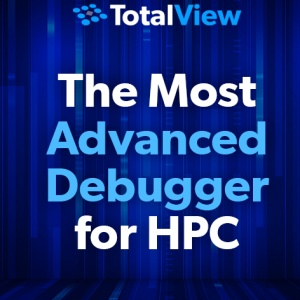As high-performance computing becomes a more ubiquitous tool for scientists and researchers in their daily lives, ensuring ease of use of these systems is important to accelerate productivity and scientific discovery.
Tools that help scientists manage their workloads and resources more effectively can help reduce the barrier to entry for new organisations or inexperienced users. Helping scientists push their workloads into the cloud, maximising the use of in-house resources or optimising the codes and increasing the efficiency are just some of the examples of benefits that help drive productivity and increase scientific output.
Debugging and code optimisation tools can help to reduce issues that may arise from software development. This has benefits in reducing the cost of code development and gives tools to scientific domain experts that help them better implement their scientific research to applications. This frees up the time of expert staff and makes it easier for companies to pursue their computing research or product development, without investing as heavily in with coding and application development.
Making software tools accessible also helps to reduce the failure of workloads and helps management teams understand what has gone wrong when things fail. Whether it be hardware monitoring delivered in cluster management software or job scheduling services which report on workload performance, HPC teams can use this information to more accurately support users and deliver a more robust HPC service for scientists and engineers.
Featured product: Accelerating Scientific Innovation with Altair High-Performance Computing (HPC) Solutions

The industry’s most demanding scientific computing requirements, in small, mid-sized, exascale and cloud computing centres, rely on Altair to accelerate innovation and keep the infrastructure running smoothly. Altair is the industry leader in high-performance, high-throughput computing solutions that orchestrate, visualize, optimize, and analyse your most demanding workloads.
Your compute journey starts in Altair Access with support for desktop integration and web portal job submission, monitoring and remote visualization. End-users are empowered to focus on science and solutions and need no knowledge of typical HPC operating environments to run simulations.
Best in class administration portals in Altair Control simplify system management, scheduling policy optimisation, user quota accounting and cost-efficient automatic cloud bursting of excess workloads.
Altair PBS Professional is the heart of the Altair HPC workload management solution. Powerful and customisable for system administrators and performant for end-users, Altair PBS Professional should be your first choice for HPC system administration and scheduling.
Find out more about PBS Works from Altair's website.
__________
Featured product: TotalView by Perforce

Advanced HPC Debugging and Analysis
TotalView is debugging software designed for complex applications and extensive parallelism and concurrency. It provides the specialized tools you need to quickly analyze, debug, and help find problems in your high-performance computing (HPC) applications.
With TotalView, teams can spend more time focused on the HPC solutions needed to answer life’s bigger questions – and less time on debugging.
Reverse debugging enables developers to quickly solve difficult issues. They can easily record and deterministically replay the execution of programs under the debugger’s control. And with the output from TotalView’s memory debugging feature, you can easily find memory leaks and ensure that there are no memory errors.
TotalView’s comprehensive toolkit includes debugging multi-thread and multi-process applications written in C, C++, Fortran, and Python applications calling into C/C++. TotalView supports debugging a large variety of HPC technologies including OpenMP, MPI, and debugging CUDA applications running on NVIDIA GPUs.
Find out more about TotalView from the Perforce website.
__________
Other products
Adaptive Computing’s Moab HPC Suite is a workload and resource orchestration platform that automates the scheduling, managing, monitoring and reporting of HPC workloads on a massive scale. Its patented intelligence engine uses multi-dimensional policies and advanced future modelling to optimise workload start and run times on diverse resources.
Nodus Cloud OS is intelligent cloud management technology that enables seamless access to compute resources, whether on-premise or in the cloud. Cloud deployment on any of the leading cloud providers becomes easily attainable with Nodus. It simplifies the complexities of running HPC and enterprise workloads and applications in the cloud.
Altair provides high-throughput computing solutions that help you orchestrate, visualise, optimise and analyse in the data centre and the cloud. The Altair PBS Works suite includes workload manager Altair PBS Professional, designed to improve productivity, optimise utilisation and efficiency, and simplify administration for clusters, clouds and supercomputers, from the biggest HPC workloads to millions of small, high-throughput jobs.
Appentra’s Parallelware Trainer and Parallelware Analyser are novel tools for the development of C/C++/Fortran parallel code for multicore CPUs and GPUs using OpenMP and OpenACC. Designed in collaboration with experts in parallel programming from HPC, they provide a systematic, more predictable approach that leverages parallel programming best practices, and enables writing parallel codes performing to as high a standard as those written by experts.
Arm Allinea Studio is a complete suite of tools for developing Arm-based server and HPC applications and Arm Neoverse processors. It provides commercially supported products for simple and efficient code generation, and full capability for understanding and optimising workloads for optimum performance on Arm.
Bright Computing’s Bright Cluster Manager software offers an integrated solution for building and managing HPC clusters that reduces complexity, accelerates time to value and provides enormous flexibility.
Bright Clusters for Hybrid Cloud automates the process of building and managing a Linux cluster.
Charmworks’ Charm++ is a mature, highly scalable parallel programming framework that enables applications to effectively scale regardless of the execution landscape. Charm++ provides a C++ type of interface that works with Fortran, C and C++ codes.
Charm++ helps creators of compute-intensive software deliver better shared and distributed memory parallel application performance.
TrinityX, from Clustervision, is designed to provide all services required in a modern HPC system, allowing full customisation of your cluster installation.
With TrinityX, built-in services like OpenLDAP, SLURM, Zabbix, NTP and many more are provided through standard installations. TrinityX also includes optional modules for specific needs, such as an OpenStack cloud, Docker on the compute nodes and the ability to partition a cluster.
GigaIO-powered composable infrastructure provides the freedom to disaggregate and recompose your rack resources. From CLI (command line interface) and RedFish interfaces, to complete Slurm integration and automated resource scheduling features with Quali CloudShell, or to running containers and VMs, the user can choose the tool best suited for their environment.
GitLab is a complete DevOps platform. With GitLab, you get a complete CI/CD toolchain in a single application. GitLab is a single application that spans the entire software development lifecycle. Moving to a single application can speed up your workflow and help you deliver better software, faster.
Q-Leap Networks’ Qlustar is a Linux HPC/storage cluster OS that is open source, free, simple to setup, extend, operate, monitor and update. It can turn networked servers into a powerful compute cluster running simulation codes and/or a fast and scalable parallel filesystem.
ScaleMP’s vSMP ClusterONE enables users to consolidate servers into a single system. An HPC cluster of up to 32 servers can be turned into a single, easy-to-manage system, eliminating all cluster complexity and reducing management overhead.
The software effectively creates a super-sized workstation to enable the leap from desktop computing to HPC-scale deployment, with no special knowledge needed.
Modern companies are increasingly challenged to adapt to rapid data growth and real-time processing requirements. Xelera Suite, from Xelera Technologies, is a hardware-agnostic, on-demand scalable and easy-to-deploy acceleration platform which takes care of the customer’s acceleration needs in a click.
Zapata’s Orquestra is a workflow-based, unified toolset for applied quantum computing that allows users to compose and run quantum workflows across a range of devices, both quantum and classical, on a unified quantum operating environment.
Orquestra enables enterprise teams to orchestrate across quantum computing frameworks to compose, run, and analyse quantum workflows at scale.


